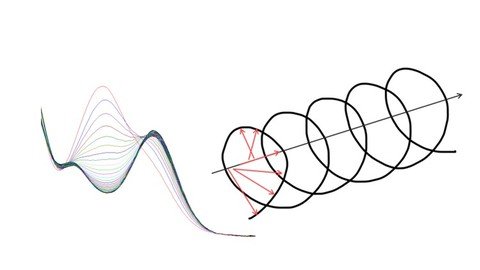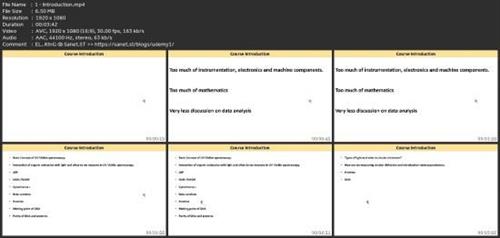- Thread Starter
- #1
Uv-Visible Spectroscopy And Circular Dichroism Spectroscopy

What you'll learn
Basic Concept of UV-Visible spectroscopy.
Interaction of organic molecules with light and what do we measure in UV-Visible spectroscopy.
UV-Visible spectrum of ATP
UV-visible spectrum of NAD+/NADH
UV-Visible spectrum of cytochrome-c
UV-Visible spectrum of Beta-carotene
UV-Visible spectrum of Proteins
UV-Visible spectrum and melting point of DNA
UV-Visible spectrum and purity of DNA and proteins
Types of light and what is circular dichroism?
How are we measuring circular dichroism and introduction various parameters.
Circular dichroism of proteins
Circular dichroism of DNA
Additional learning on Ramachandran plot of proteins
Requirements
No previous skills are required
Enthusiasm to learn biology and techniques related to biology, biochemistry and organic chemistry
Description
The major issues with the courses on spectroscopy are inclusion of too much instrumentation, electronics, mathematical calculations, and very less discussion on data analysis. This course on UV-Visible spectroscopy and circular dichroism spectroscopy for the students is for the students who want to learn the basic aspects and the data analysis by using so many examples. This course will be teaching about two major and important techniques related to biology and organic chemistry that is UV visible spectroscopy and circular dichroism spectroscopy. It is a perfect introductory course for the students which starts its journey with discussion on basic concept of visible spectroscopy and it tells you about how different organic molecules with double bonds, with conjugated systems, and with lone pairs are interacting with light. Then it starts discussing about different examples of UV visible spectroscopy data analysis with the help of graphs. In the third section, it talks about circular dichroism by starting with types of light and what is actually circular dichroism. Then it tells you how we are measuring CD, circular dichroism, what is ellipticity, basic formulas, basic discussion of fundamentals, and basic mathematics of CD. Then it goes on and talks about circular dichroism of proteins by taking 3 to 4 examples. Then finally, the third section ends with circular dichroism of DNA. This course also contains a additional learning section where you learn about a very interesting but complicated topic, The Ramachandran plot of protein secondary structures. So, guys, let us enjoy the whole discussion on UV visible spectroscopy and circular dichroism spectroscopy. All the best.
Overview
Section 1: Introduction to the course
Lecture 1 Introduction
Section 2: UV-Visible Spectroscopy
Lecture 2 Basic concept of UV-Visible Spectroscopy
Lecture 3 Interactions of organic molecules with UV-Visible light
Lecture 4 What do we look in UV-Visible spectrum
Lecture 5 UV-Visible spectrum of ATP
Lecture 6 UV-Visible spectrum of NAD+/NADH
Lecture 7 UV-Visible spectrum of Cytochrome c
Lecture 8 UV-Visible spectrum of Beta-Carotene
Lecture 9 UV-Visible spectrum of proteins
Lecture 10 UV-Visible spectroscopy and melting point of DNA
Lecture 11 UV-Visible spectroscopy and purity of DNA and proteins
Lecture 12 Reference readings
Section 3: Circular Dichroism Spectroscopy
Lecture 13 Basic Beer-Lambert law
Lecture 14 Types of lights - Unpolarized, plane polarized and circularly polarized light
Lecture 15 What is circular dichroism
Lecture 16 How do we measure circular dichroism
Lecture 17 Ellipticity as the measurement of circular dichroism
Lecture 18 Circular dichroism of proteins - 1
Lecture 19 Circular dichroism of proteins -2
Lecture 20 Circular dichroism of proteins -3
Lecture 21 Circular dichroism of DNA
Lecture 22 References to read circular dichroism spectroscopy
Section 4: Additional learning - Ramachandran Plot for proteins
Lecture 23 Ramachandran plot
Bachelor's students of biology, organic chemistry, biochemistry and life sciences.,Master's students of biology, organic chemistry, biochemistry and life sciences.,Researchers in the field of biology, organic chemistry, biochemistry and life sciences.,Medical students and medical professionals,Biology, organic chemistry, biochemistry and life science enthusiasts

rapidgator.net:
nitroflare.com:

Published 9/2024
MP4 | Video: h264, 1920x1080 | Audio: AAC, 44.1 KHz
Language: English | Size: 202.96 MB | Duration: 1h 12m
Spectroscopy
MP4 | Video: h264, 1920x1080 | Audio: AAC, 44.1 KHz
Language: English | Size: 202.96 MB | Duration: 1h 12m
Spectroscopy
What you'll learn
Basic Concept of UV-Visible spectroscopy.
Interaction of organic molecules with light and what do we measure in UV-Visible spectroscopy.
UV-Visible spectrum of ATP
UV-visible spectrum of NAD+/NADH
UV-Visible spectrum of cytochrome-c
UV-Visible spectrum of Beta-carotene
UV-Visible spectrum of Proteins
UV-Visible spectrum and melting point of DNA
UV-Visible spectrum and purity of DNA and proteins
Types of light and what is circular dichroism?
How are we measuring circular dichroism and introduction various parameters.
Circular dichroism of proteins
Circular dichroism of DNA
Additional learning on Ramachandran plot of proteins
Requirements
No previous skills are required
Enthusiasm to learn biology and techniques related to biology, biochemistry and organic chemistry
Description
The major issues with the courses on spectroscopy are inclusion of too much instrumentation, electronics, mathematical calculations, and very less discussion on data analysis. This course on UV-Visible spectroscopy and circular dichroism spectroscopy for the students is for the students who want to learn the basic aspects and the data analysis by using so many examples. This course will be teaching about two major and important techniques related to biology and organic chemistry that is UV visible spectroscopy and circular dichroism spectroscopy. It is a perfect introductory course for the students which starts its journey with discussion on basic concept of visible spectroscopy and it tells you about how different organic molecules with double bonds, with conjugated systems, and with lone pairs are interacting with light. Then it starts discussing about different examples of UV visible spectroscopy data analysis with the help of graphs. In the third section, it talks about circular dichroism by starting with types of light and what is actually circular dichroism. Then it tells you how we are measuring CD, circular dichroism, what is ellipticity, basic formulas, basic discussion of fundamentals, and basic mathematics of CD. Then it goes on and talks about circular dichroism of proteins by taking 3 to 4 examples. Then finally, the third section ends with circular dichroism of DNA. This course also contains a additional learning section where you learn about a very interesting but complicated topic, The Ramachandran plot of protein secondary structures. So, guys, let us enjoy the whole discussion on UV visible spectroscopy and circular dichroism spectroscopy. All the best.
Overview
Section 1: Introduction to the course
Lecture 1 Introduction
Section 2: UV-Visible Spectroscopy
Lecture 2 Basic concept of UV-Visible Spectroscopy
Lecture 3 Interactions of organic molecules with UV-Visible light
Lecture 4 What do we look in UV-Visible spectrum
Lecture 5 UV-Visible spectrum of ATP
Lecture 6 UV-Visible spectrum of NAD+/NADH
Lecture 7 UV-Visible spectrum of Cytochrome c
Lecture 8 UV-Visible spectrum of Beta-Carotene
Lecture 9 UV-Visible spectrum of proteins
Lecture 10 UV-Visible spectroscopy and melting point of DNA
Lecture 11 UV-Visible spectroscopy and purity of DNA and proteins
Lecture 12 Reference readings
Section 3: Circular Dichroism Spectroscopy
Lecture 13 Basic Beer-Lambert law
Lecture 14 Types of lights - Unpolarized, plane polarized and circularly polarized light
Lecture 15 What is circular dichroism
Lecture 16 How do we measure circular dichroism
Lecture 17 Ellipticity as the measurement of circular dichroism
Lecture 18 Circular dichroism of proteins - 1
Lecture 19 Circular dichroism of proteins -2
Lecture 20 Circular dichroism of proteins -3
Lecture 21 Circular dichroism of DNA
Lecture 22 References to read circular dichroism spectroscopy
Section 4: Additional learning - Ramachandran Plot for proteins
Lecture 23 Ramachandran plot
Bachelor's students of biology, organic chemistry, biochemistry and life sciences.,Master's students of biology, organic chemistry, biochemistry and life sciences.,Researchers in the field of biology, organic chemistry, biochemistry and life sciences.,Medical students and medical professionals,Biology, organic chemistry, biochemistry and life science enthusiasts
Screenshots

rapidgator.net:
You must reply in thread to view hidden text.
nitroflare.com:
You must reply in thread to view hidden text.
